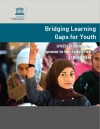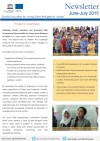Crisis and Transition Response
UNESCO contributes to relief and reconstruction in countries in crisis and transition situations in the fields of education, the sciences, culture and communication, in close coordination within the overall United Nations system-wide response.
UNESCO places its emphasis on the human and institutional dimensions of relief, recovery and reconstruction, with a focus on supporting access to quality education, protecting culture, including World Heritage at risk, and promoting freedom of expression and information during and in the aftermath of crisis so as to lay the foundations for stable and sustainable recovery towards long-term development.
Contributing to humanitarian response, UNESCO provides direct support to help communities in coping with the immediate impact of crisis on their daily lives. UNESCO ensures access to fundamental services, such as quality education for children and youth, as well as access, through support to the local media, to life-saving information.
With its unique mandate to protect cultural heritage in times of conflict, UNESCO promotes and undertakes mitigating measures to prevent and address damage and destruction; as well as looting and illicit trafficking of cultural property.
UNESCO also enables country-driven recovery and longer-term development. Through technical assistance and advisory services to local and national authorities and civil society, support is provided for damage and needs assessment, as well as capacity development of affected institutions and professionals.
UNESCO believes in the positive contribution of education, culture, communication and the sciences to peace. It supports these dimensions in dialogue, reconciliation and peace-building programmes and initiatives.









